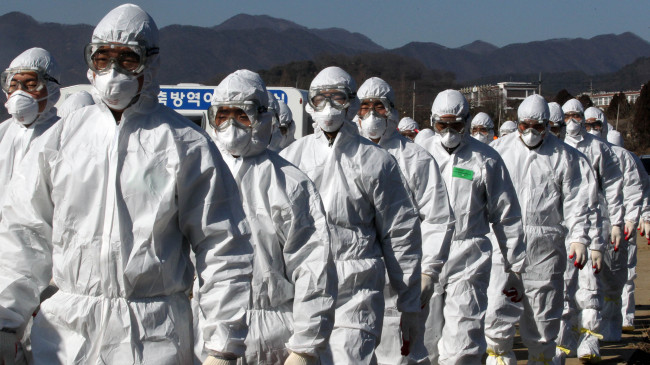Officials consider nationwide lockdown on poultry farms
First H5N8 infection confirmed in chickens
 |
|
Soldiers walk into a chicken farm in Buyeo, South Chungcheong Province, to cull poultry infected with the highly pathogenic H5N8 flu strain Sunday. (Yonhap) |
The government is considering ordering a lockdown at all poultry farms in the country to prevent the avian influenza virus spreading further, officials said Sunday.
If the government imposes the order, all poultry, workers and vehicles from farms will be banned from moving for 48 hours. The lockdown procedure can be continued for another two days, officials added.
The move came after the first H5N8 infection in chickens was reported Saturday, adding to concerns of a recent upturn in the disease’s spread in Korea.
“The AI infection broke out in South Jeolla and Chungcheong provinces, followed by North Jeolla Province. If necessary, the government will use all measures, including a nationwide stand-still.” Lee Joon-won, Deputy Minister of Agriculture, Food and Rural Affairs, said at a press briefing.
“But nothing has been decided yet,” he said.
If issued, it will be the first time the regulation has been imposed nationwide since the system was introduced in February 2012.
The government on Sunday issued a temporary lockdown on the poultry industry in Gyeonggi Province and North and South Chungcheong Province, effective from 6:00 a.m. to 6:00 p.m. Monday.
The Agriculture Ministry confirmed Saturday that a chicken in Buyeo, South Chungcheong Province, had been infected with the H5N8 strain of the virus.
The chicken farm in Buyeo is about 80 kilometers north of where the first outbreak of the bird flu was discovered.
The distance is nearly eight times the 10-kilometer radius quarantine zone designated by the ministry.
Another case of the highly pathogenic bird flu strain was confirmed at a duck farm in Haenam, South Jeolla Province, at the southern tip of the peninsula.
Prime Minister Chung Hong-won on Sunday also ordered officials to take stronger quarantine measures at an emergency meeting.
“All related ministries should deploy manpower to support the AI situation room. The (Agriculture) minister will be directly in charge for a fast decision-making process,” Chung said.
The prime minister reiterated at the meeting that migratory birds such as Baikal teal are presumably the very likely source of the spread.
He called for the restriction of any human activities near reservoirs or lakes where the birds rest during the migratory season.
Health authorities expect complications may occur this week, when the virus ends its 10-day incubation period.
The period also overlaps with Seollal, Lunar New Year, when tens of thousands of Koreans hit the road to meet their families and friends all across the country.
A total of 29.2 million people, more than half of the Korean population, visited their hometown during last year’s Seollal, according to the Korea Transport Institute. This year’s New Year holiday begins from Thursday.
So far, there are no known cases of human beings being infected by H5N8.
“We don’t find it necessary to raise the bird flu alert to ‘serious’ from ‘cautious’ at the moment. But we will keep monitoring the progress of the virus and make the decision,” the ministry said in its statement on Sunday.
Four additional cases of suspected infection were reported during the weekend, including those in Naju and Yeongam in South Jeolla Province.
Since the first outbreak, the ministry has culled over 488,000 poultry at 35 farms.
More than 1.47 million more chickens and ducks at 42 farms will be slaughtered, they said.
The latest bird flu epidemic is the fifth outbreak in the country.
South Korea has had a total of four outbreaks of highly pathogenic bird flu since the first in 2003. All outbreaks in 2003, 2006, 2008 and 2010 were caused by the H5N1 type of the virus.
While China and other countries with AI infection experienced human deaths, there were no reports of human infections in Korea.
By Suk Gee-hyun (monicasuk@heraldcorp.com)